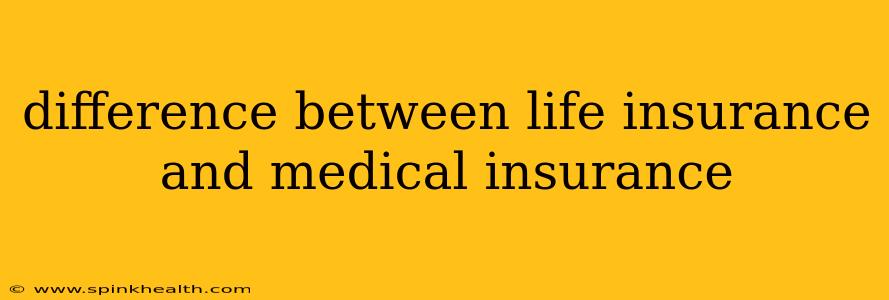Life Insurance vs. Medical Insurance: Two Sides of the Financial Security Coin
The world of insurance can feel like a labyrinth, especially when trying to understand the core differences between seemingly similar products. Life insurance and medical insurance, while both crucial for financial well-being, serve entirely different purposes. Think of them as two pillars supporting the financial roof of your life – one protects your loved ones after you’re gone, the other safeguards you during your lifetime.
Let's embark on a journey to unravel the distinctions, using a storytelling approach to make it easier to grasp.
Imagine Sarah, a young professional with a growing family. She’s diligently planning for her future, and understanding the difference between life insurance and medical insurance is paramount. Sarah needs both to ensure her family's financial security and her own well-being.
What is Life Insurance?
Life insurance is a contract between you (the policyholder) and an insurance company. You pay premiums regularly, and in return, the insurance company promises to pay a death benefit to your designated beneficiaries (like your spouse, children, or parents) upon your death. This death benefit provides financial support to your loved ones to cover expenses such as funeral costs, outstanding debts, mortgage payments, college tuition, or simply to maintain their lifestyle. It's a safety net, providing financial stability during a difficult time.
Think of it like this: Sarah secures a life insurance policy. Tragically, she passes away unexpectedly. Her policy's death benefit helps her family cover their immediate expenses and provides financial security for their future, enabling her children to continue their education.
What is Medical Insurance?
Medical insurance, unlike life insurance, protects you against the high costs of healthcare. You pay premiums, and the insurance company covers a portion or all of your medical bills, depending on your plan. This includes doctor visits, hospital stays, surgeries, medications, and other healthcare services. Medical insurance helps you manage the financial burden of unexpected illnesses or injuries, preventing crippling debt.
Continuing Sarah's story: Suppose Sarah falls ill and needs a major surgery. Her medical insurance significantly reduces the financial strain of the hefty medical bills, allowing her to focus on her recovery.
Key Differences Summarized:
Here's a table highlighting the key differences:
| Feature | Life Insurance | Medical Insurance |
|---|---|---|
| Purpose | Protects loved ones after your death | Protects you against healthcare costs |
| Payout Trigger | Death of the policyholder | Illness or injury requiring medical treatment |
| Beneficiary | Designated individuals (spouse, children, etc.) | The policyholder |
| Coverage | Lump-sum death benefit | Coverage for medical expenses |
What are the different types of life insurance?
There are several types of life insurance, each with its own features and benefits:
- Term Life Insurance: Provides coverage for a specific period (term), offering a lower premium but no cash value accumulation.
- Whole Life Insurance: Offers lifelong coverage and builds cash value, which can be borrowed against or withdrawn.
- Universal Life Insurance: Combines the flexibility of adjustable premiums with lifelong coverage and cash value accumulation.
What are the different types of medical insurance?
Similar to life insurance, medical insurance also comes in various forms:
- HMO (Health Maintenance Organization): Offers a network of doctors and hospitals, requiring referrals for specialist visits.
- PPO (Preferred Provider Organization): Provides a wider network of doctors and hospitals, generally allowing you to see specialists without referrals, but at a higher cost.
- Medicare: A government-sponsored health insurance program for individuals 65 and older and certain younger people with disabilities.
Do I need both life insurance and medical insurance?
The short answer is: it depends. However, for most people, especially those with dependents or significant debts, both are highly recommended. Life insurance protects your loved ones financially after your death, while medical insurance safeguards your financial well-being during your lifetime. They are not mutually exclusive; they work in tandem to provide comprehensive financial security.
Sarah's story highlights the importance of understanding both types of insurance. By carefully considering her needs and circumstances, she can secure her family's financial future, ensuring peace of mind for herself and her loved ones. The choice of specific policies should be made in consultation with a financial advisor who can help determine the right coverage levels based on individual circumstances.

